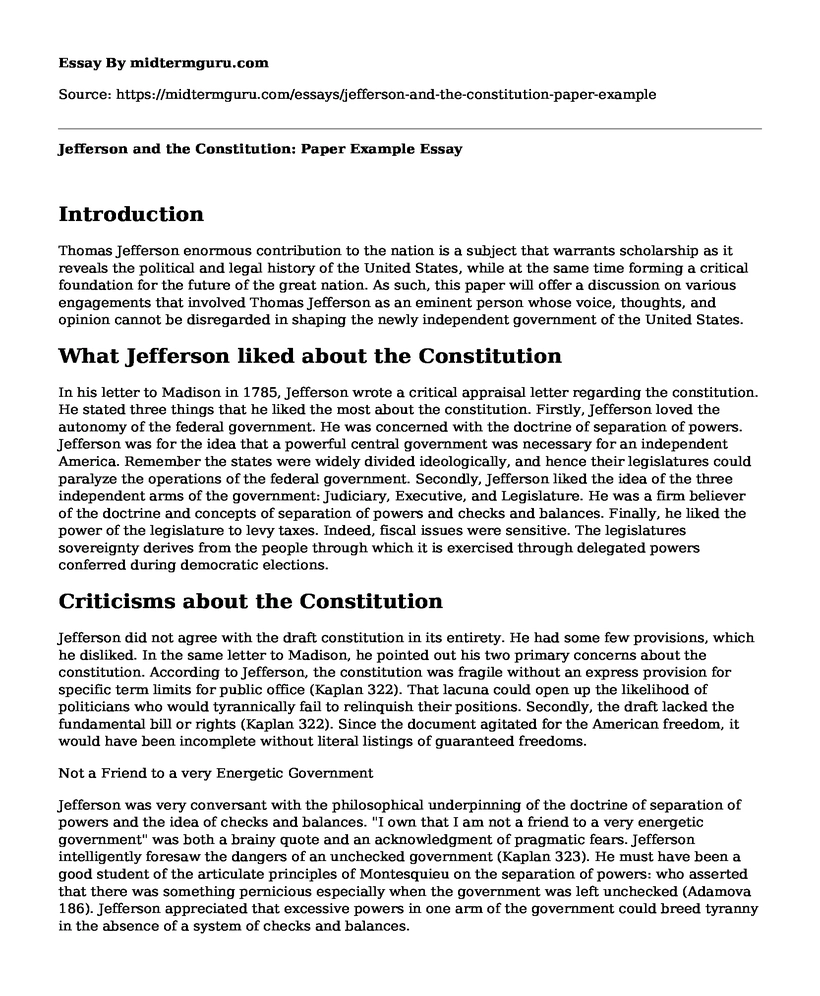Introduction
Thomas Jefferson enormous contribution to the nation is a subject that warrants scholarship as it reveals the political and legal history of the United States, while at the same time forming a critical foundation for the future of the great nation. As such, this paper will offer a discussion on various engagements that involved Thomas Jefferson as an eminent person whose voice, thoughts, and opinion cannot be disregarded in shaping the newly independent government of the United States.
What Jefferson liked about the Constitution
In his letter to Madison in 1785, Jefferson wrote a critical appraisal letter regarding the constitution. He stated three things that he liked the most about the constitution. Firstly, Jefferson loved the autonomy of the federal government. He was concerned with the doctrine of separation of powers. Jefferson was for the idea that a powerful central government was necessary for an independent America. Remember the states were widely divided ideologically, and hence their legislatures could paralyze the operations of the federal government. Secondly, Jefferson liked the idea of the three independent arms of the government: Judiciary, Executive, and Legislature. He was a firm believer of the doctrine and concepts of separation of powers and checks and balances. Finally, he liked the power of the legislature to levy taxes. Indeed, fiscal issues were sensitive. The legislatures sovereignty derives from the people through which it is exercised through delegated powers conferred during democratic elections.
Criticisms about the Constitution
Jefferson did not agree with the draft constitution in its entirety. He had some few provisions, which he disliked. In the same letter to Madison, he pointed out his two primary concerns about the constitution. According to Jefferson, the constitution was fragile without an express provision for specific term limits for public office (Kaplan 322). That lacuna could open up the likelihood of politicians who would tyrannically fail to relinquish their positions. Secondly, the draft lacked the fundamental bill or rights (Kaplan 322). Since the document agitated for the American freedom, it would have been incomplete without literal listings of guaranteed freedoms.
Not a Friend to a very Energetic Government
Jefferson was very conversant with the philosophical underpinning of the doctrine of separation of powers and the idea of checks and balances. "I own that I am not a friend to a very energetic government" was both a brainy quote and an acknowledgment of pragmatic fears. Jefferson intelligently foresaw the dangers of an unchecked government (Kaplan 323). He must have been a good student of the articulate principles of Montesquieu on the separation of powers: who asserted that there was something pernicious especially when the government was left unchecked (Adamova 186). Jefferson appreciated that excessive powers in one arm of the government could breed tyranny in the absence of a system of checks and balances.
Education and Democracy
Jefferson was a firm believer in the correlation between education and liberation. According to him, the masses were the only people who could safeguard liberty and democracy (Segarra). They were the wielders of the sovereign powers of the American nation. The only way they could preserve and safeguard that power - which guaranteed their liberty was through education. No wonder he became an advocate for educational reforms.
Conclusion
Jefferson was articulate and prudent on constitutional and governance issues. His ideological and philosophical standing laid a firm foundation in the American democratic history. Jefferson had a lofty zeal for the liberation of the American through a progressive constitution and an educated population: as it took a liberated mind to safeguard the sovereign power of the Americans.
Works Cited
Adamova, Karolina. "Tyranny of the majority-a permanent threat of democracy." The Lawyer Quarterly 3.3 (2013).
Kaplan, Lawrence S. "Jefferson and the Constitution: The View from Paris, 1786-89." Diplomatic History 11.4 (1987): 321-336.
Segarra, E. "Thomas Jefferson, The First Advocate for Education Reform." 2013, www.dailysignal.com/2013/04/14/18th-century-advice-thomas-jefferson-on-education-reform/.
Thomas, Jefferson. "To James Madison Paris, Dec.20, 1787 < The Letters of Thomas Jefferson 1743-1826 < Thomas Jefferson < Presidents < American History From Revolution To Reconstruction and Beyond." www.let.rug.nl/usa/presidents/thomas-jefferson/letters-of-thomas-jefferson/jefl66.php.
Cite this page
Jefferson and the Constitution: Paper Example. (2022, Sep 19). Retrieved from https://midtermguru.com/essays/jefferson-and-the-constitution-paper-example
If you are the original author of this essay and no longer wish to have it published on the midtermguru.com website, please click below to request its removal:
- The Holocaust and Auschwitz Concentration Camp
- Studying the Presidency Essay Example
- The Long Death of Slavery in the United States - History Essay Example
- Essay on Being a Police Officer
- Research Paper on Background and Identity of Saint Padre Pio
- The Great Depression and the Financial Recession of 2008 - Essay Sample
- The Great Disparity: 30 yrs of Middle Class Perfection Shattered - Essay Sample







